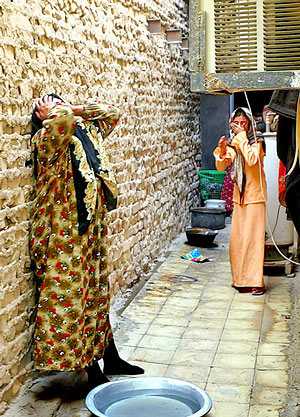- U.S. tale of Iraqis being massacred marred Memorial Day (FCN, 06-12-2006)

WASHINGTON (FinalCall.com) – As U.S. military leaders engage in political “damage control” after the Pentagon admitted that Marines killed 24 civilians in Haditha–including a 66-year-old woman and a 4-year-old boy–an Iraqi doctor is warning there are many similar stories which have not yet been told.
In Haditha, according Dr. Salam Ishmael, projects manager with Doctors for Iraq and former chief of Junior Doctors in Baghdad’s Medical City Hospital, in an interview with IPS, U.S. troops cut electricity and water to the entire city, attacked the hospital and burned the pharmacy.
“There are many, many, many cases like Haditha that are still undercover and need to be highlighted in Iraq,” Dr. Ishmael said.
U.S. troops have committed atrocities since the invasion and occupation of Iraq began in March 2003. But is it possible that the deadly resistance to U.S. forces, which has killed nearly 2,500 U.S. forces and maimed another 10,000 Iraqi civilians, has become so unpleasant for the troops that they have started retaliating against and murdering the very people who they were supposed to liberate from tyranny?
“I think clearly that’s an excellent analysis,” said peace activist David Swanson, member of United for Peace and Justice (UFPJ) which launched a telephone campaign June 5 to urge members of Congress to hold an open debate over the war, in an interview. “Many of our troops were sent in, having been trained to expect gratitude from the Iraqis, instead they are facing hostility and ingratitude from the Iraqis,” he said, adding “They see these people killed and tortured, and wounded, and raped and they do not see them as people.”
The UFPJ campaign won a symbolic victory when the House Republican leadership agreed to a limited, rather than an open debate on Iraq.
“They see them as enemies, and as people to be sadistically abused. Not all of our soldiers have accepted this framework, but many, under incredible stress, and under abuse by our military, having been lied to about the reasons they’ve been sent there–to put their lives in danger–and having been kept past their terms of service, they are indeed clearly taking out frustrations and anger on Iraqis,” said Mr. Swanson.
“It’s possible. It’s possible,” Dr. Pamela Brewer, a psychologist, social worker and host of Pacifica Radio’s MyndTalk program, told The Final Call, concerning speculation that members of the U.S. military might be misplacing their anger toward their officers and political leadership by brutalizing, even murdering Iraqi civilians.
The Pentagon withdrew the accused Marines from Iraq and launched a criminal investigation, promising new “ethical training” for all U.S. troops before they are sent overseas.
“Uh, It’s a possibility, but the problem is, that you don’t know how much of it can be attributed to that, unless you’ve got some statements on the record to that effect,” Dr. Ronald Walters, Professor of Political Science at the University of Maryland, told The Final Call. “Or whether or not it is, that it is, as it is…which is to say that esprit d’corps, it’s just that sometimes when one of their people gets wiped out, they take it out on the local folks. That’s probably far more the case than the other way around. But if you’ve got some stuff that’s on the record then I’d say, ‘Yeah. Sure it’s a possibility.’”
In November 2005, said Dr. Ishmael, the U.S. military attacked the hospital at Haditha three times.
“A severe breach of the Geneva Conventions. In one of these attacks, the U.S. soldiers used live ammunition inside the hospital. They handcuffed all the doctors and destroyed the entire contents of the medical storage. It ended with the killing of one of the patients in his bed,” he complained.
The Iraqi Red Crescent reported at the time that nearly 1,000 families had been forced to flee their homes in Haditha following the launch of the U.S. military operation there.












